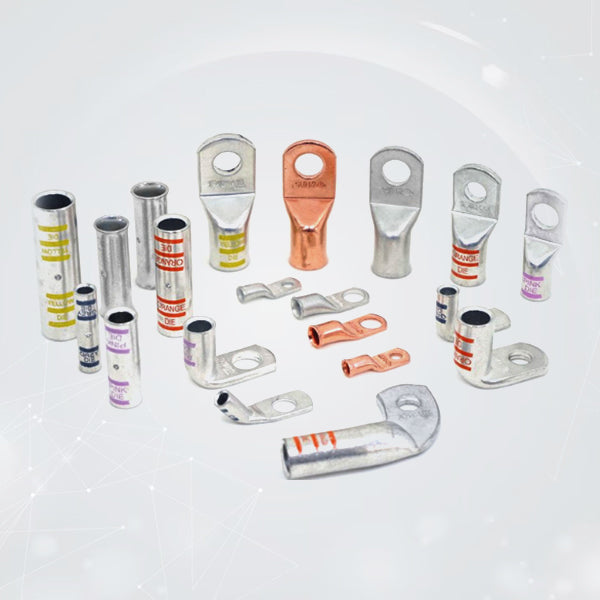
Why Copper Lugs Are the Best Choice for High-Voltage Electrical Connections
When working with high-voltage electrical systems—whether in automotive, industrial, marine, or solar applications—the importance of a reliable connection cannot be overstated. The choice of battery cable ends is not just about convenience; it's a matter of safety, performance, and efficiency.
Enter copper lugs—the trusted standard for high-current connections. In this blog, we’ll explore why bare copper lugs and heavy duty wire lugs made from copper continue to be the preferred choice for professionals and enthusiasts alike.
What Are Copper Lugs?
Copper lugs are electrical connectors made from high-conductivity copper. They are designed to terminate heavy-gauge wires and cables, allowing a secure connection to electrical terminals or equipment. These battery cable ends are available in a variety of designs, such as straight, angled, flared, and closed-end, each suited for specific installation needs.
At their core, copper lugs create low-resistance, high-durability connections that are vital in high-voltage settings. Poor connections in such environments can lead to overheating, voltage drops, and even electrical fires.
Explore SELTERM’s Bare Copper Battery Cable Lugs
Why Material Choice Matters in High-Voltage Connections
Not all metals conduct electricity equally. Copper has long been favored for electrical applications because of its unique properties.
High Electrical Conductivity
Copper is second only to silver in terms of electrical conductivity. This allows bare copper lugs to transfer high currents efficiently, minimizing resistance and energy loss—key to high-voltage systems.
Thermal Stability
Copper’s ability to withstand high temperatures makes it ideal for demanding electrical applications. It resists deformation and breakdown, ensuring continued performance in environments where other materials might fail.
Corrosion Resistance
While tinned copper offers additional protection in corrosive environments, high-quality bare copper ring terminals are still suitable for many dry or sealed applications, especially when paired with protective heat shrink tubing.
Mechanical Strength and Malleability
Copper is both strong and malleable, which allows for tight, secure crimps without cracking or breaking. This results in a more reliable connection over time, especially in environments subject to vibration or movement.
Comparing Copper Lugs to Other Materials
To understand the superiority of copper, let’s compare it to other common lug materials:
| Material | Electrical Conductivity | Durability | Common Use Cases |
| Copper | Excellent | High | Automotive, solar, marine, industrial |
| Aluminum | Moderate | Moderate | Utility power distribution |
| Brass/Bronze | Low | Moderate | Low-voltage control circuits |
| Steel | Poor | High (mechanical) | Grounding only; not suitable for current flow |
For applications where safety, performance, and reliability are critical, copper lugs remain the most suitable option.
Common Applications of Copper Lugs
Automotive Systems
From car audio installations to alternator wiring and starter cables, battery cable ends made of copper ensure safe and efficient current flow in high-amp applications.
Solar and Off-Grid Power Systems
Battery banks, inverters, and charge controllers require reliable connections. Bare copper lugs help ensure consistent power delivery in renewable energy setups.
Industrial Equipment
Machines with heavy-duty motors and control panels rely on heavy duty wire lugs to maintain operational safety and reduce power loss.
Marine Systems
Although tinned copper is typically preferred in saltwater environments, bare copper lugs are still used in protected marine applications, especially where corrosion is not a concern.
How to Choose the Right Copper Lug
When selecting copper lugs for a high-voltage application, consider the following criteria:
Wire Gauge Compatibility
- Match the lug to the specific cable gauge to ensure a proper fit and crimp.
- Mismatched sizes can lead to increased resistance or even mechanical failure.
Stud Size
Make sure the lug’s stud hole matches the terminal hardware. Standard stud sizes include 1/4", 5/16", and 3/8".
Lug Design
- Closed-end lugs offer enhanced environmental protection.
- Chamfered or flared entries allow for easier cable insertion.
- Long barrel lugs provide stronger mechanical bonds and accommodate double crimps.
Shop a wide variety of options at SELTERM’s Copper Lug Collection
Best Practices for Installation
Proper installation of copper lugs ensures maximum efficiency and long-term reliability.
Use the Right Crimping Tool
Always use a professional-grade crimping tool matched to the cable gauge. Inadequate tools can result in weak or uneven crimps.
Prepare the Cable Properly
Strip the insulation carefully, avoiding any damage to the copper strands. Ensure the cable fits snugly into the lug barrel without gaps or exposed wires.
Apply a Firm Crimp
Crimp with even pressure and, for added security in high-vibration environments, consider applying two crimps if using a long barrel lug.
Seal the Connection
Use heat shrink tubing or dielectric grease to protect the joint from moisture and corrosion. This is especially important in outdoor, marine, or automotive applications.
Mistakes to Avoid
- Using mismatched lug and wire sizes
- Reusing old or damaged lugs
- Neglecting sealing or insulation
- Applying improper or weak crimps
- Using incompatible lug materials (e.g., aluminum for high-amp applications)
Even small mistakes in lug installation can compromise system performance or pose a safety risk.
Why Choose SELTERM Copper Lugs?
At SELTERM, we offer premium bare copper lugs that meet the highest industry standards. Our products are:
- UL Listed and RoHS compliant
- Made from 99.9% pure copper
- Designed with precision-machined barrels for easy installation
- Available in a wide range of sizes, styles, and stud configurations
- Ideal for use in automotive, industrial, solar, and marine applications
Visit SELTERM to explore our full lineup of battery cable ends and heavy duty wire lugs.
Final Thoughts
In high-voltage systems, every connection matters. Choosing the right copper lugs ensures maximum current flow, minimizes energy loss, and protects against system failure.
Whether you're working on a complex solar installation, upgrading your vehicle's electrical system, or wiring industrial machinery, bare copper lugs from SELTERM offer the performance and reliability you can count on.
When safety, performance, and efficiency are non-negotiable, copper is the right connection.

